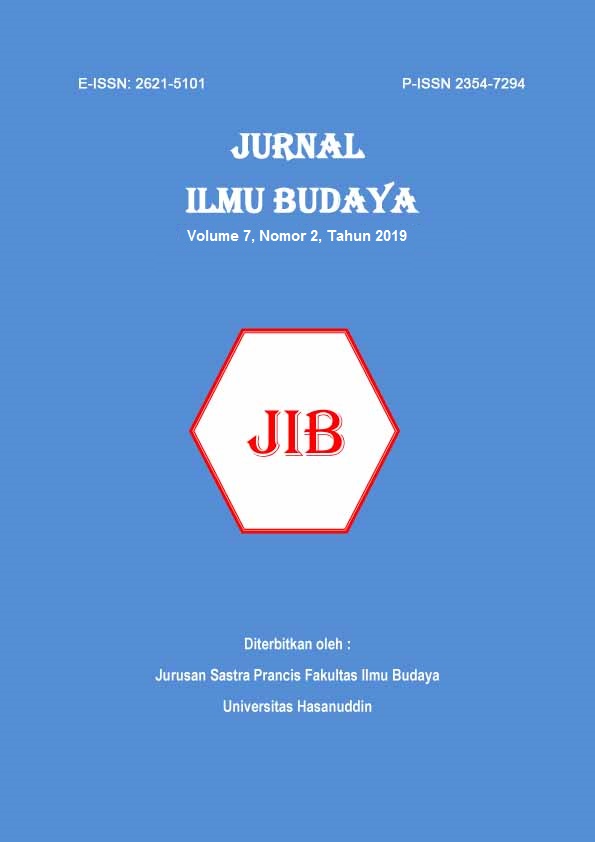DAPUR, MAKANAN, DAN RESISTENSI PEREMPUAN DALAM CERITA PENDEK KUTUKAN DAPUR KARYA EKA KURNIAWAN
DOI:
https://doi.org/10.34050/jib.v7i2.7958Keywords:
Food, Kitchen, Indonesian Literature, Woman ResistanceAbstract
Food and culinary has become a subject that has recently been discussed in the study of literature and popular culture. Food and culinary is not just about the fulfillment of primary needs of human, satisfy hunger and thirst, but also deals with social practices, lifestyle, identity, and even ideology. This paper will discuss food and culinary in relation to women's resistance in Eka Kurniawan’s short story entitled Kutukan Dapur (Curse of the Kitchen). This short story tells the character Maharani who learned a lot about food, culinary, and power relations after visiting a museum. The method used is a structural study of narratology that is deepened with Pierre Bourdieu's concepts of field, power struggle, and capital. the reading of the structure of the text shows that there are two parallel narratives representing the present time and the past. The present time tells the story of Maharani who is trapped in the marriage life that is holding her back, while the past presents the story of Diah Ayu who is intelligent and admired for her cooking skills and rebellion. The results of the analysis show that through focalisation of Maharani, the kitchen as a domestic space that is identical to the limitations of the women’s world, can turn into a field for women's resistance to reach power.Downloads
References
Aoyama, Tomoko. (2008). Reading Food in modern Japanese literature. Honolulu: The University of Hawai’i Press.
Bourdieu, Pierre (1984)” Espace social et genèse des classes”, dalam Actes de la Recherche en Sciences Sociales, Vol. 52-53
Bourdieu, Pierre (1990). “La domination masculine” dalam Actes de la Recherche en Sciences Sociales, Vol. 84.
Ciaciuch, C. (2016). Feeding feminisms: Hispanic women writer's culinary literature (Order No. 10163771). Available from ProQuest Dissertations & Theses Global. (1831357738). Retrieved from https://remote-lib.ui.ac.id:2076/docview/1831357738?accountid=17242
Davis, D. A., & Powell, T. (Eds.). (2014). Writing in the kitchen : Essays on southern literature and foodways. Retrieved from https://remote-lib.ui.ac.id:2195
Genette, Gérard. (1983). Narrative Discourse: An Essay in Method (Jane E. Lewin, penerj.), New York: Cornell University Press. (Judul asli Discours du récit)
Lancaster, S. J. (2006). Too many cooks: Contested authority in the kitchen.Southern Literary Journal, 38(2), 113-130. Retrieved from https://remote-lib.ui.ac.id:2155/docview/216419638?accountid=17242
Marino , A. D. (2012). At the kitchen table: Women and food in late twentieth-century U.S. multiethnic and global women's literature (Order No. 3546766). Available from ProQuest Dissertations & Theses Global. (1267152160). Retrieved from https://remote-lib.ui.ac.id:2155/docview/1267152160?accountid=17242
Meah, A. (2014). Reconceptualizing power and gendered subjectivities in domestic cooking spaces. Progress in Human Geography, 38(5), 671-690. doi:http://remote-lib.ui.ac.id:2068/10.1177/0309132513501404
Moraga, C.L.2001. The Hungry Woman: A Mexican Medea. Albuquerque, New Mexico: West End Press.
Smith, C. (2010). Tulsa Studies in Women's Literature, 29(2), 490-492. Retrieved from http://remote-lib.ui.ac.id:2093/stable/41337303
Vázquez, D.,J. (2018). "They don't understand their own oppression": Complicating preservation in john rechy's the miraculous day of amalia gómez. The Arizona Quarterly, 74(1), 17-43. doi:http://remote-lib.ui.ac.id:2090/10.1353/arq.2018.0001
Zubiaurre, M. (2006). Culinary Eros in Contemporary Hispanic Female Fiction: From Kitchen Tales to Table Narratives. College Literature, 33(3), 29-51. Retrieved from http://remote-lib.ui.ac.id:2093/stable/25115365
Downloads
Published
Issue
Section
License
Copyright (c) 2019 JURNAL ILMU BUDAYA

This work is licensed under a Creative Commons Attribution-NonCommercial 4.0 International License.







